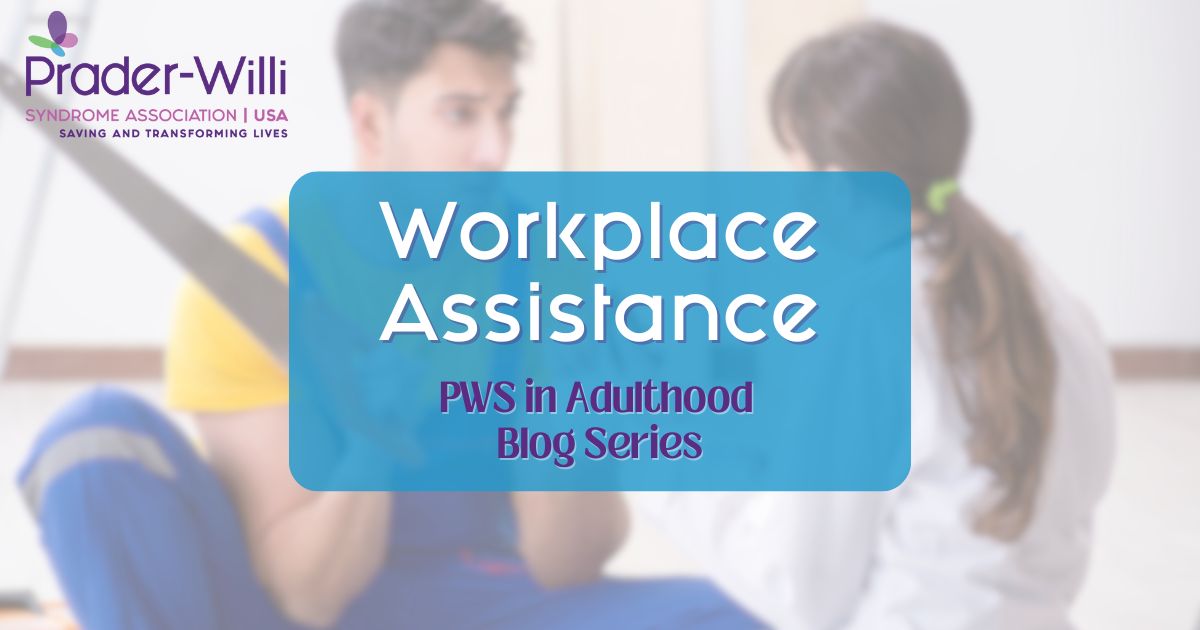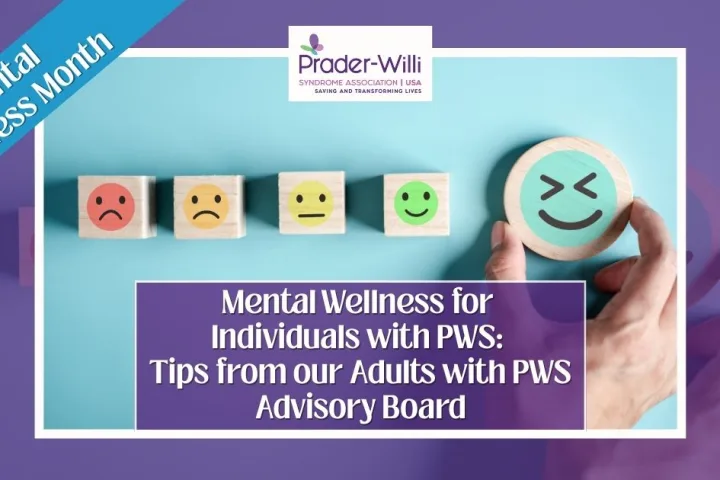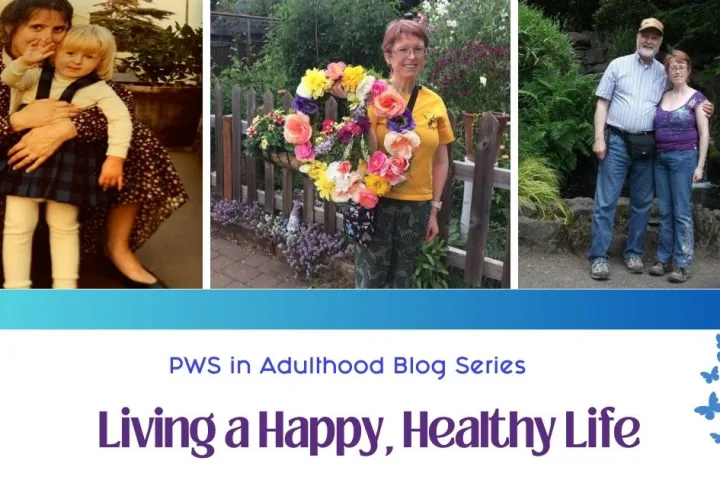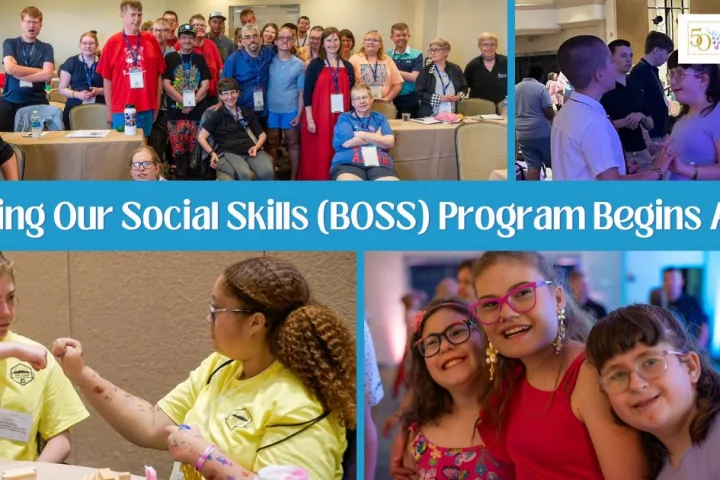As Brooke Fuller, an adult living with PWS, recently said in a PWS United podcast, “Everyone has the same condition, but we’re all different.”
The PWS in Adulthood blog series seeks to document the variety of ways adults with PWS find their version of independence, or interdependence, and how they participate in their families and communities through school, work, relationships, and more. As younger families look towards the future, they may be comforted to read how adults with PWS are living rich, fulfilling lives. As caregivers of adults with PWS read these blogs, they may be inspired to read how other adults are navigating life in the older years. This blog is yet another glimpse into the possibilities of what it may look like, living with PWS in Adulthood.
Contributed by Jill Boughton
Our 35-year-old daughter’s case manager discovered that our state at least finances something called “workplace assistance” that provides a one-on-one with her at a job site (unlike vocational rehab services that are designed to fade away as the worker becomes more skilled or self-sufficient). Her behaviorist trains that person, and her only responsibility is to be with our daughter and keep eyes on her all the time, especially when she uses the restroom, gets her (packed) lunch from the break room, etc. This generally works well–and our daughter is high-functioning enough that she tells us when she feels unsafe because a particular caregiver becomes inattentive, or when the workplace is sponsoring an eating event for employees (she just stays home that day or goes in later).
The biggest problem we’ve had is with soft skills like getting out of bed, following the dress code, and finishing preparations to get to work on time, or calling off for trivial complaints that amount to “I don’t feel like going to work today.” It helps to have an understanding employer!
My daughter doesn’t take the initiative to form relationships, but she is friendly when she sees folks at work she happens to know in other ways (church, previous staff, etc.) And her behavior consultant has gotten together a gals’ group who do craft and recreational activities together that don’t involve food.
Share Your PWS in Adulthood Story
Is your loved-one an adult with PWS?
- – What steps did you take to prepare for their life as an adult?
- – What does independence look like for them?
- – What supports do they have in place?
- – Do they have romantic relationships and how are those maintained?
- – Do they work or volunteer in their community and what does that look like?
- – Do you have advice for parents on how and when to prepare for adulthood?
Share your story for our PWS in Adulthood Blog series by emailing africke@pwsausa.org.
Share this!





 Perry A. Zirkel has written more than 1,500 publications on various aspects of school law, with an emphasis on legal issues in special education. He writes a regular column for NAESP’s Principal magazine and NASP’s Communiqué newsletter, and he did so previously for Phi Delta Kappan and Teaching Exceptional Children.
Perry A. Zirkel has written more than 1,500 publications on various aspects of school law, with an emphasis on legal issues in special education. He writes a regular column for NAESP’s Principal magazine and NASP’s Communiqué newsletter, and he did so previously for Phi Delta Kappan and Teaching Exceptional Children. Jennifer Bolander has been serving as a Special Education Specialist for PWSA (USA) since October of 2015. She is a graduate of John Carroll University and lives in Ohio with her husband Brad and daughters Kate (17), and Sophia (13) who was born with PWS.
Jennifer Bolander has been serving as a Special Education Specialist for PWSA (USA) since October of 2015. She is a graduate of John Carroll University and lives in Ohio with her husband Brad and daughters Kate (17), and Sophia (13) who was born with PWS. Dr. Amy McTighe is the PWS Program Manager and Inpatient Teacher at the Center for Prader-Willi Syndrome at the Children’s Institute of Pittsburgh. She graduated from Duquesne University receiving her Bachelor’s and Master’s degree in Education with a focus on elementary education, special education, and language arts.
Dr. Amy McTighe is the PWS Program Manager and Inpatient Teacher at the Center for Prader-Willi Syndrome at the Children’s Institute of Pittsburgh. She graduated from Duquesne University receiving her Bachelor’s and Master’s degree in Education with a focus on elementary education, special education, and language arts. Evan has worked with the Prader-Willi Syndrome Association (USA) since 2007 primarily as a Crisis Intervention and Family Support Counselor. Evans works with parents and schools to foster strong collaborative relationships and appropriate educational environments for students with PWS.
Evan has worked with the Prader-Willi Syndrome Association (USA) since 2007 primarily as a Crisis Intervention and Family Support Counselor. Evans works with parents and schools to foster strong collaborative relationships and appropriate educational environments for students with PWS. Staci Zimmerman works for Prader-Willi Syndrome Association of Colorado as an Individualized Education Program (IEP) consultant. Staci collaborates with the PWS multi-disciplinary clinic at the Children’s Hospital in Denver supporting families and school districts around the United States with their child’s Individual Educational Plan.
Staci Zimmerman works for Prader-Willi Syndrome Association of Colorado as an Individualized Education Program (IEP) consultant. Staci collaborates with the PWS multi-disciplinary clinic at the Children’s Hospital in Denver supporting families and school districts around the United States with their child’s Individual Educational Plan. Founded in 2001, SDLC is a non-profit legal services organization dedicated to protecting and advancing the legal rights of people with disabilities throughout the South. It partners with the Southern Poverty Law Center, Protection and Advocacy (P&A) programs, Legal Services Corporations (LSC) and disability organizations on major, systemic disability rights issues involving the Individuals with Disabilities Education Act (IDEA), Americans with Disabilities Act (ADA), and the federal Medicaid Act. Recently in November 2014, Jim retired.
Founded in 2001, SDLC is a non-profit legal services organization dedicated to protecting and advancing the legal rights of people with disabilities throughout the South. It partners with the Southern Poverty Law Center, Protection and Advocacy (P&A) programs, Legal Services Corporations (LSC) and disability organizations on major, systemic disability rights issues involving the Individuals with Disabilities Education Act (IDEA), Americans with Disabilities Act (ADA), and the federal Medicaid Act. Recently in November 2014, Jim retired.